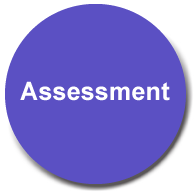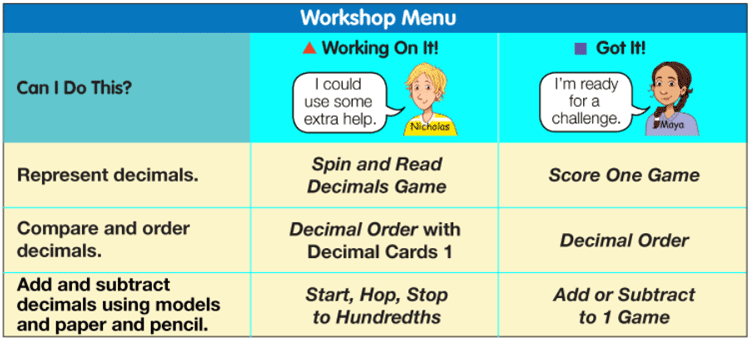The following components of the assessment program provide teachers with the tools to plan instruction and communicate student progress on the mathematical content in Grade 5..

x
Resources for Teachers
- Charles, R. “Big Ideas and Understandings as the Foundation for Elementary and Middle School Mathematics.” Journal of Mathematics Education Leadership, 7 (3), pp. 9–24, 2005.
- Dacey, L., and J.B. Lynch. Math for All: Differentiating Instruction Grades 3–5. Math Solutions Publications, CA, 2007.
- Guskey, T.R., and J.M. Bailey. Developing Grading and Reporting Systems for Student Learning. Corwin Press, Inc., CA, 2001.
- Jorgensen, M. “Assessing Habits of Mind: Performance-Based Assessment in Science and Mathematics.” Eric Clearinghouse for Science, Mathematics, and Environmental Education, Columbus, OH, 1994.
- Krulik, S., and J.A. Rudnick. Assessing Reasoning and Problem Solving: A Sourcebook for Elementary School Teachers. Allyn and Bacon, Pearson, NJ, 1998.
- Murray, M., with J. Jorgensen. The Differentiated Classroom: A Guide for Teachers, K–8. Heinemann, Portsmouth, NH, 2007.
- Pellegrino, J.W. and S.R. Goldman. “Beyond Rhetoric: Realities and Complexities of Integrating Assessment into Classroom Teaching and Learning.” In The Future of Assessment: Shaping Teaching and Learning. C. Dwyer, ed. Erlbaum, Mahwah, NJ, 2007.
- Principles and Standards for School Mathematics. National Council of Teachers of Mathematics, Reston, VA, 2000.
- Stenmark, J.K., and W.S. Bush, eds. Mathematics Assessment: A Practical Handbook for Grades 3–5. National Council of Teachers of Mathematics, Reston, VA, 2001.
- Tomlinson, C.A. How to Differentiate Instruction in Mixed-Ability Classrooms. 2nd Ed. Association for Supervision and Curriculum Development, Alexandria, VA, 2001.
- Van de Walle, J.A., and L. Lovin. Teaching Student-Centered Mathematics: Grades 3–5. Pearson Education, Boston, 2006.















 ) on the Unit 8 Key Assessment Opportunities Chart. See Figure 2. In this unit, students will also get better acquainted with the Math Practices Expectations by discussing them in the context of a specific problem, receiving feedback, reviewing a peer’s work, and revising their own work.
) on the Unit 8 Key Assessment Opportunities Chart. See Figure 2. In this unit, students will also get better acquainted with the Math Practices Expectations by discussing them in the context of a specific problem, receiving feedback, reviewing a peer’s work, and revising their own work.